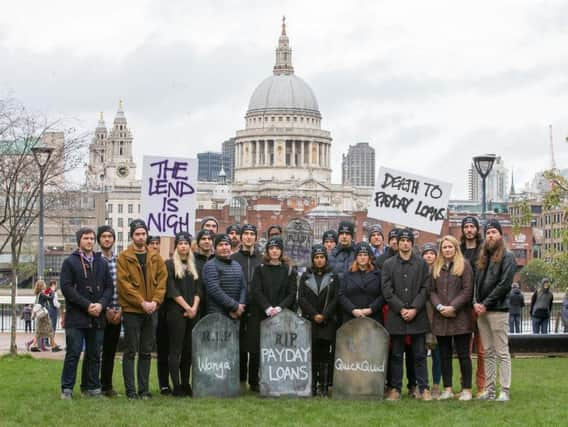Blackfriar: Let's hope 2022 will see the end of payday lenders


Most people who have been forced to take out payday loans do so because their finances mean they need money before they get paid at the end of the month. In the past, they had no option but to use a payday loan, paying back ridiculous levels of interest.
However, the market place has been transformed by the introduction of income streaming, which gives workers access to their earnings before payday.
Advertisement
Hide AdAdvertisement
Hide AdPlayers like Wagestream want to solve the cash flow problems created by the monthly pay cycle, which sees a significant percentage of people taking out ultra-high interest loans to pay unexpected bills.
They give workers access to money they have already “earned”, but haven’t been given.
This market place is now moving to mass-market adoption, with firms such as Bupa, Rentokil and the NHS leading the charge.
Wagestream enables employees to receive a percentage of their accrued earnings at any time during the month, sparing them from using payday lenders.
Advertisement
Hide AdAdvertisement
Hide AdWorkers can draw down earned funds using a mobile app for a flat fee of £1.75.
Wagestream said the average advance is £84 and the average employee uses Wagestream 2.2 times per month, paying a flat fee of £1.75 each time they use it.
One Wagestream user said she used the app because her kids needed new school shoes and she was nowhere near payday.
Research shows that around half of employees worry about money while they’re at work, making them less productive and more prone to mental illness. Many are worried they won’t be able to pay their bills, get new school uniforms for their kids or pay an unexpected bill.
Advertisement
Hide AdAdvertisement
Hide AdWith 48 per cent of people saying that money worries are a distraction at work, supporting the financial wellbeing of the workforce is not only good for employees, it’s also good for business.
Just like physical or mental wellbeing, financial wellbeing is a measure of financial health. Most users simply want to feel a greater sense of financial security and have a bit more control over their finances.
People who have never used a payday lender have little idea of how stressful life can be for a vast proportion of our society.
That includes me. I had no idea what life is like on a zero hours contract until my 18-year old son got a job in hospitality to pay for his gap year trip to Costa Rica to volunteer on an eco project.
Advertisement
Hide AdAdvertisement
Hide AdHe needs £3,500 to pay for the trip and he rightly thought he should earn the money.
However, he had to find money for his rent and living expenses. Without parental intervention, he would have had no way to pay for a roof over his head or for food. It is no wonder that so many people fall off the radar and become homeless.
We have to ask ourselves what sort of a society are we that we do so little to protect employees, who are willing to work long hours on a zero hours contract for a minimum wage.
Companies like Wagestream are leading the way and they deserve our full support, but surely this is a matter that the Government should be looking at.
Advertisement
Hide AdAdvertisement
Hide AdIt is very easy for those of us who have money to neglect people in society who deserve an awful lot more.
After a decade of austerity, we need to do our bit and we need to make sure that the Government plays its part.